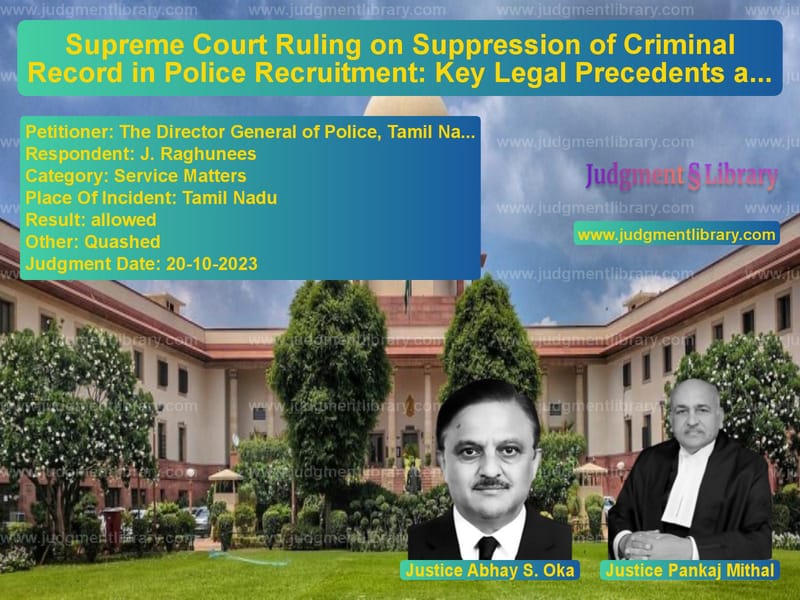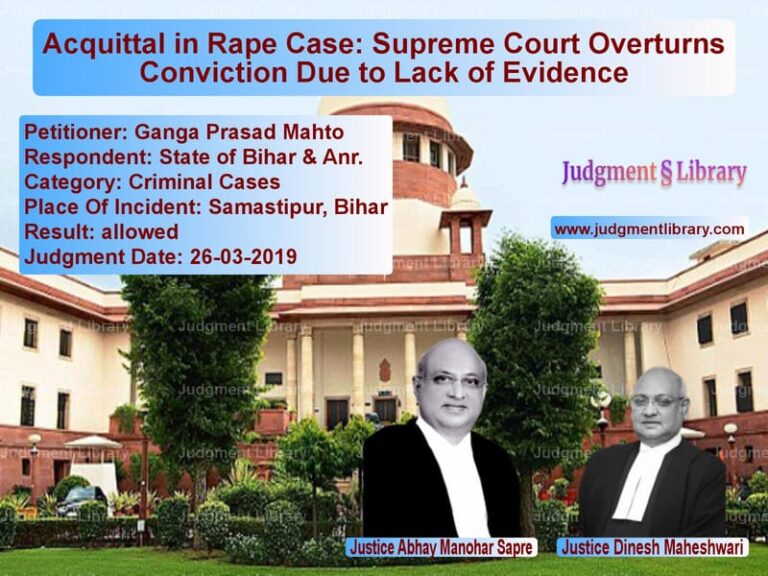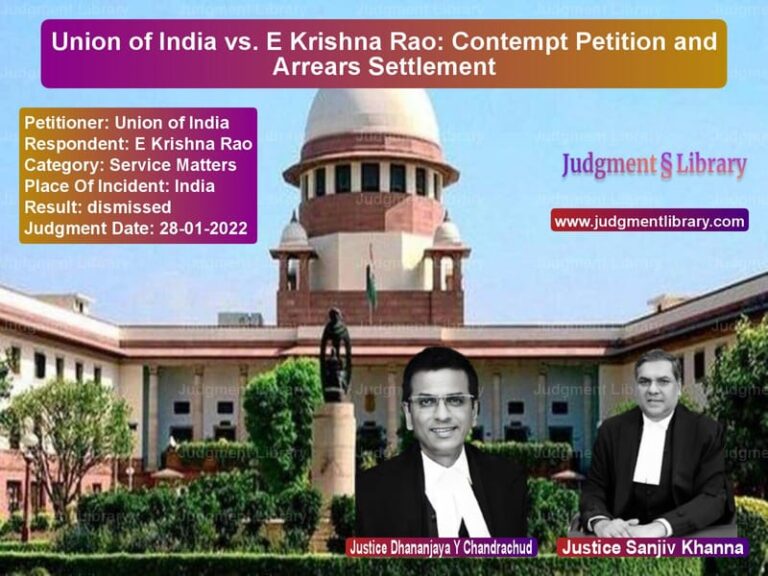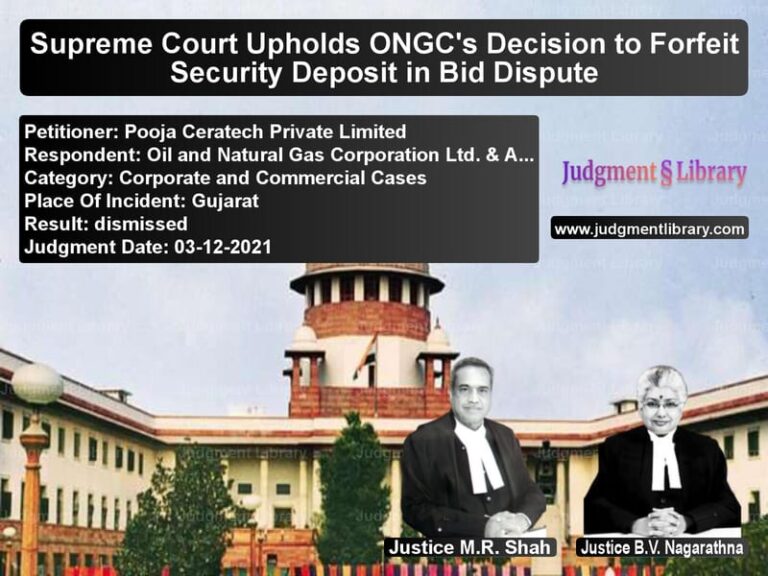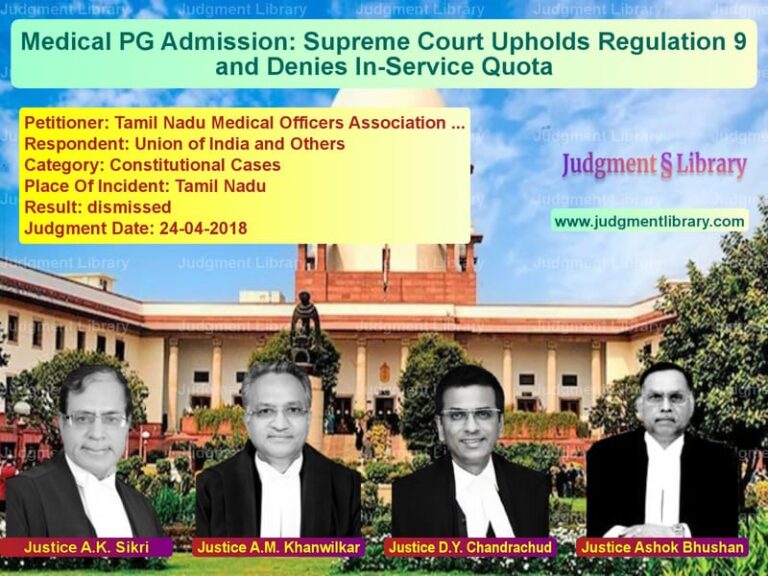Supreme Court Ruling on Suppression of Criminal Record in Police Recruitment: Key Legal Precedents and Implications
The Supreme Court of India recently delivered a critical judgment in the case of The Director General of Police, Tamil Nadu vs. J. Raghunees, addressing the issue of suppression of material facts in police recruitment. The ruling reinforces the principles of integrity and transparency in public service, emphasizing that suppression of past criminal involvement, even if it resulted in acquittal, can justify rejection from law enforcement positions.
Background of the Case
The case arose when J. Raghunees, a candidate selected for the post of Grade-II Constable in Tamil Nadu, was found to have suppressed information regarding his involvement in a criminal case (Crime No. 392 of 1997) under Sections 341, 323, 324, and 506(II) of the Indian Penal Code (IPC). Although he was later acquitted, he failed to disclose this fact in the attestation form required for police recruitment.
Following a verification process, the authorities rejected his appointment on November 9, 2004, citing suppression of material facts. Raghunees challenged this decision in the High Court of Madras.
High Court Rulings
- Single Judge Bench: The initial petition filed by Raghunees was dismissed, with the court holding that he had misrepresented facts and was thus ineligible for appointment.
- Division Bench: The Division Bench of the Madras High Court overturned the decision, ruling that since the candidate had been acquitted before the verification process, he had no obligation to disclose the prior case.
- The High Court further ruled that the omission was neither willful nor intentional and directed the authorities to reinstate Raghunees.
The State of Tamil Nadu, through the Director General of Police, challenged this decision in the Supreme Court.
Petitioner’s (State’s) Arguments
- The police force requires a high degree of integrity, honesty, and transparency. Any candidate who conceals facts, even unintentionally, is unfit for service.
- The recruitment rules clearly state that candidates must disclose whether they have been involved in criminal cases, regardless of the final outcome.
- By answering ‘NO’ in the verification form, Raghunees provided false information, making him ineligible for appointment.
- The High Court failed to consider established legal precedents that require full disclosure from candidates applying for public service positions.
Respondent’s (Raghunees’) Arguments
- Since he had been acquitted before the recruitment process, he believed that his past case was irrelevant and did not require disclosure.
- The omission was neither deliberate nor intended to mislead the authorities.
- The High Court’s decision was justified in holding that the non-disclosure did not amount to fraud.
Supreme Court’s Key Observations
The Supreme Court examined the case in light of previous judgments, particularly Avtar Singh v. Union of India (2016) 8 SCC 471, which held that non-disclosure of past criminal cases in recruitment forms can lead to disqualification.
1. Importance of Transparency in Public Service
The Supreme Court emphasized that candidates seeking appointment in disciplined forces like the police must demonstrate the highest standards of integrity. The judgment stated:
“The requirement of full disclosure is paramount in recruitment to law enforcement agencies. A person who suppresses material facts cannot be considered fit for such an appointment.”
2. Nature of Acquittal is Irrelevant
The Court clarified that an acquittal, whether based on merit or benefit of doubt, does not absolve a candidate of the duty to disclose past criminal involvement.
“The fact of acquittal does not diminish the obligation to disclose. The employer has the right to assess suitability based on full and truthful disclosure.”
3. Willful Suppression vs. Innocent Omission
The Supreme Court held that even if the suppression was unintentional, it still amounted to misrepresentation.
“The respondent was required to disclose his prior case. His failure to do so resulted in suppression of material facts, warranting disqualification.”
Final Judgment
- The Supreme Court set aside the High Court’s ruling and upheld the rejection of Raghunees’ appointment.
- Held that failure to disclose involvement in a criminal case amounts to material suppression, making a candidate unsuitable for police service.
- Reaffirmed the principles established in Avtar Singh v. Union of India and similar cases.
Implications of the Judgment
This ruling has significant legal and administrative implications:
- Stricter Scrutiny in Recruitment: Government agencies will now enforce stricter verification of candidates’ backgrounds.
- Enhanced Accountability: The judgment reinforces the importance of integrity in public service.
- Guidance for Future Cases: Establishes a clear legal precedent for handling cases of suppression of facts in recruitment.
Conclusion
The Supreme Court’s ruling in The Director General of Police, Tamil Nadu vs. J. Raghunees sets a crucial precedent in public service recruitment, reinforcing the necessity of honesty and full disclosure. The ruling ensures that only candidates who meet the highest standards of integrity and transparency are eligible for government positions, particularly in law enforcement.
Petitioner Name: The Director General of Police, Tamil Nadu.Respondent Name: J. Raghunees.Judgment By: Justice Abhay S. Oka, Justice Pankaj Mithal.Place Of Incident: Tamil Nadu.Judgment Date: 20-10-2023.
Don’t miss out on the full details! Download the complete judgment in PDF format below and gain valuable insights instantly!
Download Judgment: the-director-general-vs-j.-raghunees-supreme-court-of-india-judgment-dated-20-10-2023.pdf
Directly Download Judgment: Directly download this Judgment
See all petitions in Public Sector Employees
See all petitions in Recruitment Policies
See all petitions in Termination Cases
See all petitions in Judgment by Abhay S. Oka
See all petitions in Judgment by Pankaj Mithal
See all petitions in allowed
See all petitions in Quashed
See all petitions in supreme court of India judgments October 2023
See all petitions in 2023 judgments
See all posts in Service Matters Category
See all allowed petitions in Service Matters Category
See all Dismissed petitions in Service Matters Category
See all partially allowed petitions in Service Matters Category

